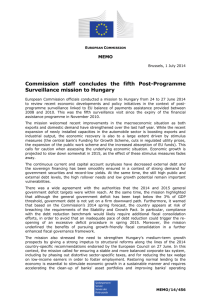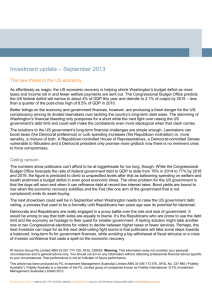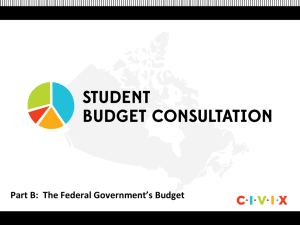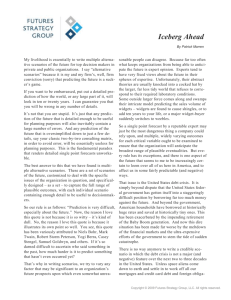Swallowing the Bitter Pill
advertisement
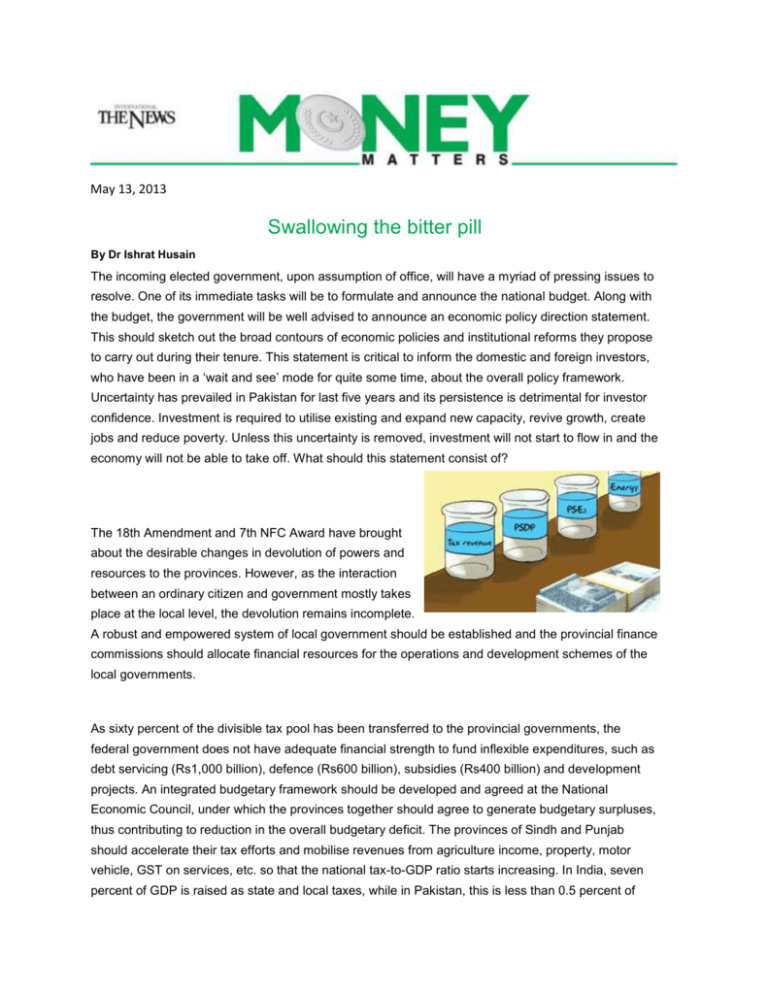
May 13, 2013 Swallowing the bitter pill By Dr Ishrat Husain The incoming elected government, upon assumption of office, will have a myriad of pressing issues to resolve. One of its immediate tasks will be to formulate and announce the national budget. Along with the budget, the government will be well advised to announce an economic policy direction statement. This should sketch out the broad contours of economic policies and institutional reforms they propose to carry out during their tenure. This statement is critical to inform the domestic and foreign investors, who have been in a ‘wait and see’ mode for quite some time, about the overall policy framework. Uncertainty has prevailed in Pakistan for last five years and its persistence is detrimental for investor confidence. Investment is required to utilise existing and expand new capacity, revive growth, create jobs and reduce poverty. Unless this uncertainty is removed, investment will not start to flow in and the economy will not be able to take off. What should this statement consist of? The 18th Amendment and 7th NFC Award have brought about the desirable changes in devolution of powers and resources to the provinces. However, as the interaction between an ordinary citizen and government mostly takes place at the local level, the devolution remains incomplete. A robust and empowered system of local government should be established and the provincial finance commissions should allocate financial resources for the operations and development schemes of the local governments. As sixty percent of the divisible tax pool has been transferred to the provincial governments, the federal government does not have adequate financial strength to fund inflexible expenditures, such as debt servicing (Rs1,000 billion), defence (Rs600 billion), subsidies (Rs400 billion) and development projects. An integrated budgetary framework should be developed and agreed at the National Economic Council, under which the provinces together should agree to generate budgetary surpluses, thus contributing to reduction in the overall budgetary deficit. The provinces of Sindh and Punjab should accelerate their tax efforts and mobilise revenues from agriculture income, property, motor vehicle, GST on services, etc. so that the national tax-to-GDP ratio starts increasing. In India, seven percent of GDP is raised as state and local taxes, while in Pakistan, this is less than 0.5 percent of GDP. The provinces should utilise the additional revenue on development projects for the welfare of the citizens in the areas of education, health, drinking water, sanitation and sewerage, roads and highways, agriculture research, etc. The government, when it is able to reduce its budgetary deficit, should also be able to minimise its borrowing from the State Bank of Pakistan (SBP) and the banking system. The SBP creates highpowered money that leads to inflation. Commercial banks are quite happy to lend to the government as they do not have to allocate capital against these assets, while they earn hefty margins above Kibor on this risk-free lending. Subsequently, the private sector is crowded out for working and fixed capital. Federal tax collection will not make any appreciable shift upwards unless the maze of laws, procedures, regulations, orders, instructions and circulars is streamlined, simplified and digitalised. The complexity of these laws and rules confer enormous discretionary powers in the hand of tax collectors. Their interpretations and determination of assessment can break or make the business. These discretionary powers are the main source of corruption, connivance and leakages. The statutory regulatory orders (SROs) issued by the Federal Board of Revenue officials have created not only distortions by favouring specific firms, but also resulted in lowering of effective tax rates. While the sales tax statutory rate is above 10 percent, the effective rate is less than four percent. The powers to issue SROs should vest only in the parliament so that there is transparency in granting exemptions and concessions. Public hearings should be held by the parliamentary committee before such SROs are granted. Public sector enterprises (PSEs) have been hemorrhaging the country’s public finances for long and are widening the fiscal deficit. Overstaffing, inefficiencies, waste and mismanagement in the operations of these enterprises has created recurring liabilities that constrain the allocations required for education, health and other social services. Each PSE should be scrutinised for possible winding up, liquidation, merger, restructuring and privatisation. During the last five years, power companies alone have consumed Rs1,500 billion, thereby widening the fiscal deficit by two percent of GDP but providing no relief from power outages. The Public Sector Development Programme (PSDP) has lost its utility as it has become an unplanned hodgepodge of projects financed on political rather than economic considerations. Thousands of projects are allocated amounts equivalent to only 10 to 15 percent of the cost of completion. Low priority projects are treated on the same footing as high priority projects, which will ease shortages or remove supply bottlenecks. The result is that most projects are completed at twice or thrice the original cost, taking on average eight to 10 years to generate benefits. Rather than being allowed to linger on, the current system of PSDP allocation should be dispensed with and high priority projects should be fully funded for completion within one to two years. Energy and education are the two sectors that deserve the highest priority in the coming five years. As large infrastructure projects, such as ports, highways, railways, pipelines, terminals, airports, etc. are lumpy, highly capital-intensive and require professional management, they are fit candidates for public-private partnerships. Delhi has just completed a modern airport and a metro rail system along these lines. Pakistani businesses have both the liquidity and expertise to undertake these projects, provided there is complete transparency in awarding these projects. If every incoming government suspends, cancels or disrupts the projects of the previous government, there would hardly be an interest on the part of private investors. The time span for these mega projects extends to more than one political tenure and attention should be given that the change in government does not create unpredictability by arbitrary and vindictive actions. The government of Pakistan has not done a good job in managing its debt. The expenditure on debt servicing, which takes away 50 percent of tax revenue, can be contained or curtailed by a more professional approach towards managing debt. A debt management office, fully equipped with experts and technology, should be given the mandate and authority with accountability for results. The financing needs of the government span over the medium term but they are being met by raising short-term debt. Not only is there a roll over risk but the government is mispricing its loans. A one percent reduction in interest rate can save Rs60 billion in debt servicing. A yield curve with maturities extending from short to long term tenor will also help in developing the debt capital market. We are fortunate that we have now developed a database about the poor households throughout the country. We now know where they are located and also have record of their identification. All subsidies of various kinds should be channelled to the poor only through this mechanism. The Benazir Income Support Programme is successfully reaching out to more than four million poor households. This platform can be used for power subsidies also. Only one million out of 20 million consumers of electricity are entitled to subsidy but at present all of us – whether deserving or not – are enjoying subsidised power tariffs. These untargeted subsidies are one of the major contributors to our growing fiscal deficit. Last but not the least, the new government has to take the bull by the horns by resolving the circular debt problem. This has completely distorted the energy input and output supply situation, dislocated industrial and export production and deprived 20 million households from carrying out their daily chores of life. The problem is not that of the stock but the flow of debt. As long as the tariff determined by Nepra is not notified by the government on ‘as is’ basis, the companies incurring huge transmission distribution losses, thefts and pilferage are not restructured and allowed to operate as fully commercial entities and full recovery of dues is not ensured, the wedge between the cost of generation and sales revenue will persist and add to the circular debt. Even if the government has to fill in the gap temporarily to meet cash flow requirements, the transaction should be at an arm’s length rather than throwing tax payers’ money in a bottomless pit. The irony is that despite pouring Rs1.5 trillion, there is no light at the end of the tunnel. The economy will keep on its downward path unless the circular debt problem is resolved once for all. The above agenda is realistic, doable but requires foresight and courage on the part of the new leadership. In case they take the bitter pill now, the economy will be up and moving upwards on its rapid growth path. The writer is former governor, SBP.


